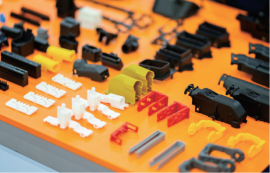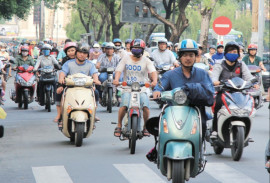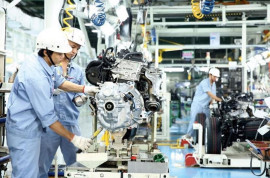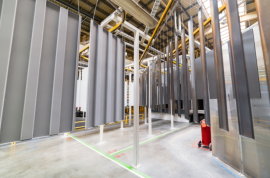In the increasingly diversified context of economic and technological development, the electric vehicle (EV) market in Vietnam has emerged as a remarkable aspect, reshaping the appearance of the transport industry. The outstanding growth of electric vehicles in recent years not only reflects the global trend of the transition to clean energy, but also poses many challenges and opportunities for Vietnam in building a sustainable and environmentally friendly transportation system.
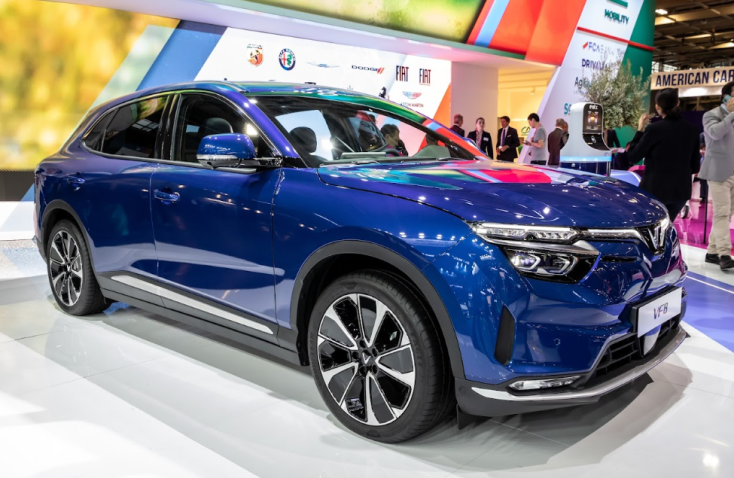
VinFast's pioneering transition: From gasoline to electric cars and a sustainable future
On January 6, 2022, at CES 2022, the world's largest Consumer Electronics Show, VinFast, Vietnam's inaugural car manufacturer, made a significant announcement. They revealed their intention to cease gasoline vehicle production and transition to electric cars by the end of 2022. Remarkably, this transition happened sooner than anticipated, with VinFast officially discontinuing gasoline car production and sales in July 2022. Presently, all of VinFast's electric car models are assembled at their Cat Hai factory in Hai Phong.
VinFast's automobile and electric motorbike complex spans 335 hectares in Dinh Vu Industrial Park, Cat Hai District, Hai Phong City. This extensive facility includes dedicated areas for car manufacturing, electric motorcycle production, electric bus assembly, and more. In its initial phase, the car factory has a production capacity of 250,000 vehicles per year, with plans to increase this to a staggering 950,000 vehicles annually by 2026.
VinFast has introduced a diverse range of six electric car models across various segments: VF e34 (C-class SUV), VF 5 Plus (A-class SUV), VF 6 (B-class SUV), VF 7 (C-class SUV), VF 8 (D-class SUV), and VF 9 (E-class SUV). Notably, on June 8, 2023, VinFast unveiled the VF 3 model in the compact car segment, marking its debut in the small car category. This particular model represents VinFast's first foray into developing a compact car tailored to the specific preferences and traffic patterns of Vietnamese consumers. As of now, the VF 6, VF 7, and VF 3 models are not yet officially available for purchase. However, the remaining models, including VF e34, VF 8, VF 9, and VF 5 Plus, have been gradually introduced to the market in 2021, 2022, and 2023, with prices ranging from 458 million to 1.57 billion VND.
In the first three months of this year, VinFast has already delivered 1,689 electric cars to customers in the Vietnamese market, comprising 773 VF e34, 865 VF 8, and 51 VF 9 models.
Recognizing that batteries are the core components of electric vehicles and represent a significant proportion of their total cost, VinFast has embarked on strategic partnerships with leading global battery manufacturers and technology companies. VinFast, along with its affiliated companies within the Vingroup conglomerate, is firmly committed to revolutionizing the electric vehicle landscape in Vietnam. Their goal is to promote a sustainable and environmentally friendly mobility ecosystem while addressing the environmental challenges associated with discarded batteries.

VinFast's collaborations with global battery manufacturers (by the end of April 2023)
Foreign electric car manufacturers make their mark in thriving Vietnamese market
The recent arrival of the Wuling HongGuang MiniEV, produced at the TMT Motors facility in Hung Yen Province, has generated considerable interest within the Vietnamese market. This compact electric car, a product of the SAIC-GM-Wuling alliance (a collaboration between the USA and China), claimed the title of the world's best-selling small electric car in 2020, 2021, and 2022. In January 2023, the SAIC-GM-Wuling alliance and TMT Motors, formerly known as the Transport Mechanical Equipment Materials Company, established in 1976 under the Department of Mechanics of the Ministry of Transport, formalized a strategic collaboration agreement.
Per this agreement, this US-China joint venture will supply components and grant exclusive rights to TMT Motors for the production, assembly, and distribution of Wuling brand electric cars in Vietnam. By May 24, 2023, the first Wuling Hongguang MiniEV produced at TMT Motors' factory had been shipped. Currently, TMT Motors' electric car factory in Van Lam District, Hung Yen Province, boasts a production and assembly capacity of 30,000 vehicles per year in its initial phase. As phase 2 unfolds, with the introduction of new electric vehicle models across various segments, the capacity is set to increase to 60,000 vehicles per year.
Wuling HongGuang MiniEV
Another noteworthy player entering the Vietnamese market is the renowned Chinese electric vehicle giant, BYD. Headquartered in Shenzhen, China, BYD initially specialized in manufacturing batteries for mobile phones and ventured into automotive manufacturing in 2003. Surprisingly, by 2022, this company had delivered 1.86 million plug-in hybrid and all-electric vehicles, surpassing Tesla's production by 42%, solidifying its position as the world's leading electric vehicle manufacturer. BYD presently operates an assembly plant for electronic equipment in Phu Tho province, Vietnam. The intent to expand investments in electric car manufacturing and assembly in Vietnam was revealed during a meeting between Mr. Wang Chuanfu, Chairman of BYD Group, and Deputy Prime Minister Mr. Tran Hong Ha in early May. The leadership of BYD Group is eager to create a conducive environment for completing investment procedures and establish a network of supporting industrial enterprises for the electric car project. While specific project details, including total investment capital, remain undisclosed, it is widely believed that BYD's presence in Vietnam will pose direct competition to VinFast, the domestic electric vehicle manufacturer.
Additionally, several other prominent automakers have consistently introduced electric vehicle models to the Vietnamese market. Imported all-electric offerings like the Hyundai Ioniq 5 and Kia EV6 are slated for introduction in Vietnam, with prices ranging from 1.33 to 1.7 billion VND. Luxury electric cars such as the Audi e-tron (ranging from 2.97 to 5.9 billion VND), Mercedes-Benz EQS (priced between 4.83 and 5.95 billion VND), and Porsche Taycan (with prices from 5.7 to 9.55 billion VND) are also poised to make an entrance. Notably, the Nissan Kicks e-POWER, a representative hybrid car, is available at a price starting from 789 million VND.
The burgeoning electric vehicle market in Vietnam reflects a global trend, with the Vietnam Automobile Manufacturers Association (VAMA) projecting an estimated 1 million electric vehicles (EVs) by around 2028, followed by robust growth from 2030 to 2040, resulting in approximately 3.5 million electric cars in Vietnam by 2040. However, the electric vehicle industry, due to the scarcity of critical resources and demanding technological requirements, is still in its nascent stages and often comes at a higher price point compared to conventional gasoline-powered vehicles. The industry remains vulnerable to supply chain disruptions, such as the recent semiconductor chip shortage, which can significantly affect production. Despite these challenges, the Vietnamese EV market is poised for significant growth in the coming years.
Challenges in Vietnam's electric vehicle infrastructure
In Vietnam, the development of electric vehicle infrastructure presents a notable challenge. Electric vehicles rely on electricity as their energy source, yet the country lacks widespread charging stations in readily accessible parking areas. This deficiency in charging infrastructure connecting different regions and cities has given rise to concerns among potential electric car buyers, who are wary of the limited charging options available.
At present, VinFast stands as the only domestic automaker in Vietnam with an extensive charging station network, boasting an impressive 150,000 charging ports. VinFast employs the CCS2 charging standard, similar to some US and European automakers, ensuring broad compatibility. However, these charging stations are currently exclusively accessible to VinFast electric vehicle owners. During Vingroup's 2023 Annual General Meeting of Shareholders, Vingroup Chairman Pham Nhat Vuong candidly expressed the company's future plans, stating, "In the next 10 years, we will consider sharing VinFast charging stations with other companies. It wouldn't make sense for us to invest $700 million in infrastructure and make it readily available to our competitors."
According to the Vingroup Chairman, VinFast is committed to providing reasonably priced vehicles to the market, coupled with excellent after-sales support. Consequently, offering charging stations as a service is a strategic move to generate additional revenue at a later stage. With the capacity of VinFast's electric car factory in Hai Phong expected to reach 950,000 units annually in the coming years and the company's expansion into electric taxi services, alongside collaborations with taxi companies and car booking service providers, it is anticipated that VinFast's current charging infrastructure may require further expansion in the future.
VinFast's electric vehicle charging station in Hanoi
Joining VinFast in the Vietnamese electric car charging station market is a new entrant, Vietnam Electricity (EVN). EVN's fast-charging pillars for electric vehicles are developed by the Central Power Electronics Production Center under EVN. Prior to commercial deployment, EVN conducted testing and established operational charging stations at various locations, including the Central Power Corporation headquarters and PVOIL petrol stations in Da Nang city. Currently, the center has delivered six charging stations for installation in Hanoi. These stations are capable of charging a battery up to 80% within 30 to 40 minutes, depending on the car's battery capacity. Moreover, they can be upgraded to accommodate multiple standards within the same charging station (CCS, Tesla, GB/T), thereby increasing the capacity to 120 kW. Notably, this marks the first rapid charging station for electric vehicles in Vietnam under a domestic brand, originating from a non-automotive manufacturer.
Luxury car brands Porsche and Audi, both of which have introduced electric vehicles in Vietnam, have also established their own fast-charging stations. Porsche's fast charging station, located at the Saigon Porsche Center, boasts a maximum power of 175 kW, enabling the Taycan to reach an 80% charge in about 40 minutes. Audi, on the other hand, operates its fast charging station in Ho Chi Minh City, known as the "Audi Charging Lounge." This facility, situated in District 1, features an indoor DC fast charging area equipped with an ABB 180 kW charging station capable of servicing two Audi vehicles simultaneously. Additionally, a Mercedes-Benz spokesperson has disclosed plans to install charging stations at several 5-star hotels and resorts across the country.
It is imperative for electric vehicle manufacturers to address the charging station dilemma as it directly impacts the vehicle's range and usability. However, the increased operation of charging stations for electric vehicles will drive up electricity demand, potentially leading to the risk of electrical overload. This, in turn, could disrupt the power system's operation and quality. Without a comprehensive solution to address the potential strain on the distribution grid resulting from a significant number of charging stations, there is a risk of destabilizing the regional power grid's operation and overall power system integrity, potentially leading to overloads.


















